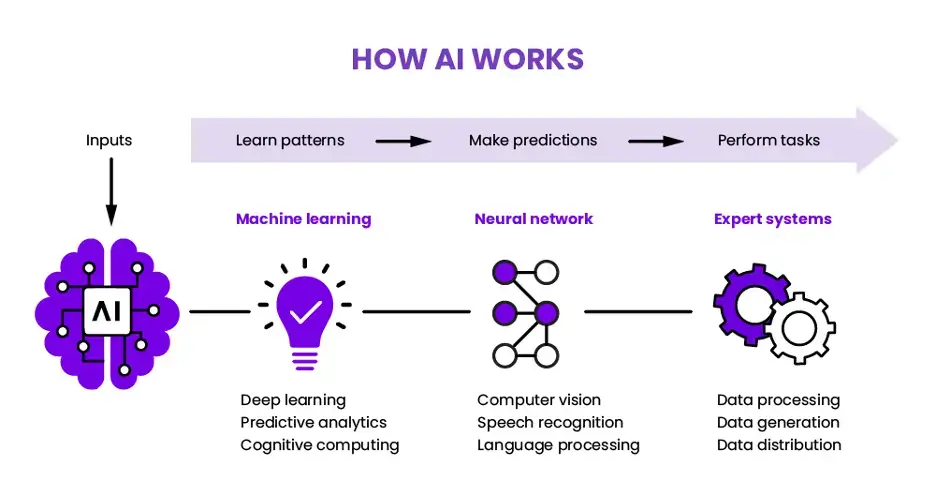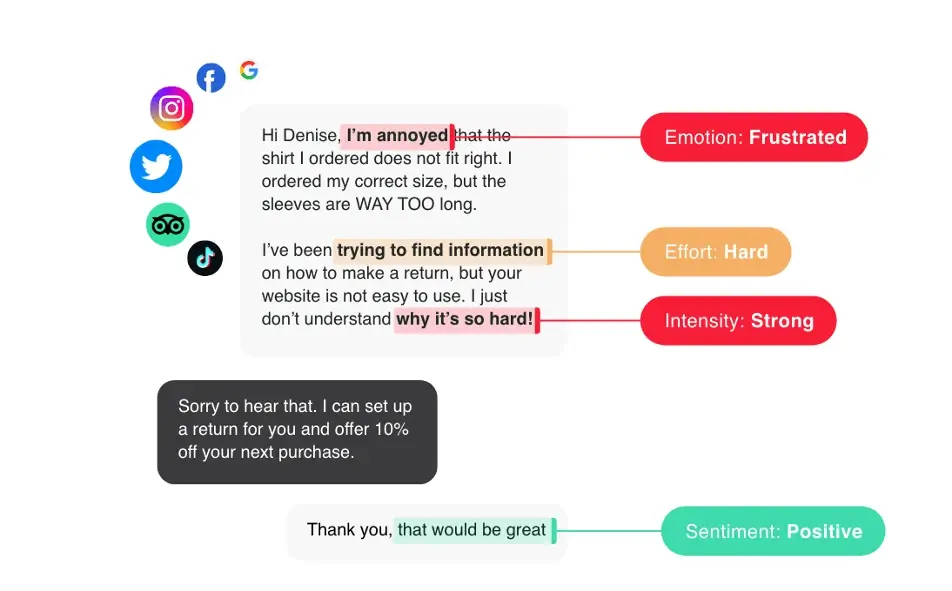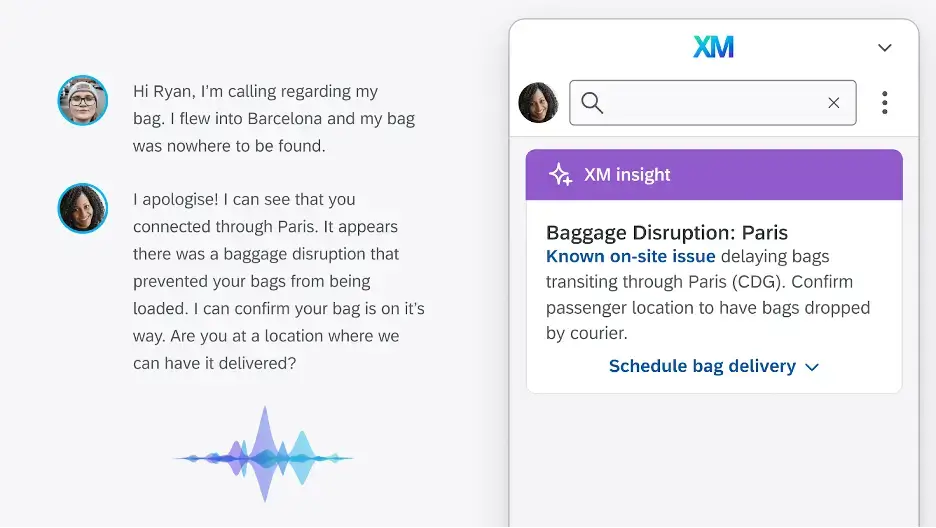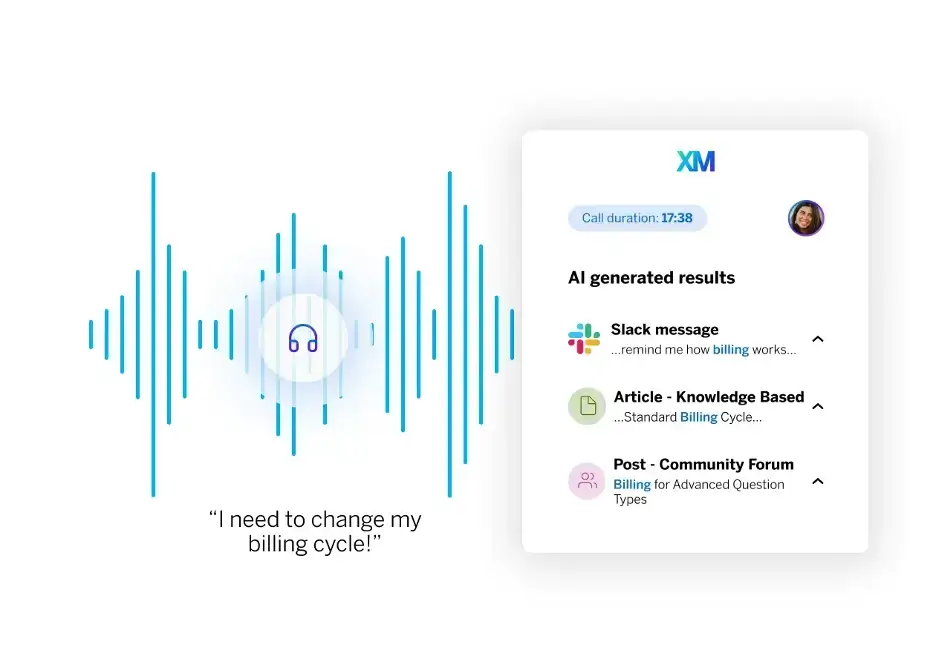
Customer Experience
How AI powered personalization is transforming CX
AI personalization is here to revolutionize customer experiences. Learn how to implement AI for increased engagement and improved customer loyalty.
What is AI personalization?
AI personalization is the offering of highly specific products, services, messaging and more, tailored to specific recipients.
Rather than basing messaging and experiences on generic learned behavioral traits and general customer demographic information, brands’ responses and outreach can be specifically targeted to individual users.
See AI powered personalization in action with AI for Frontlines
AI powered personalization explained
AI personalization is based on unique customer data inputs and on information gleaned from thousands of customer interactions, such as:
- Browsing and purchase history
- Social media interactions
- Demographic trends and behavioral data
- Customer service interactions
- Customer feedback through surveys and more

Image from weka.io
How does AI personalization use machine learning?
Artificial intelligence refers to digital software that is able to perform in a human-like way and learn from past experiences. Machine learning is a subset of AI that enables the development of algorithms and adaptive models, which allows for the analysis of vast datasets to pick out trends and calculate the probabilities of them occurring again. It can also determine which action to take for a specific end result.
AI powered personalization uses this rule-based analysis to pick out statistical information from customer data and make predictions for future customer preferences or behavior. This is what allows brands to offer hyper-personalized services that customers are more likely to engage with.
Examples of AI personalization in action
AI personalization can take many forms across the entire customer experience. Here are a few examples of AI personalization in action:
Empathetic, personalized messaging from contact centers
Customer support representatives can often be stretched thin, and covering the multitude of channels necessary in today’s market can be difficult. There’s also the increasing demand for personal connections and increased empathy across different customer interactions. For example, our research found that 5.2% of customers feel agent empathy makes a difference in their experiences - and in comparison, only 2.7% of customers value low wait times.
There’s always a concern that using AI to power chatbots and other communication tools will result in less connection. However, AI personalization can help to make customer engagement more human-like, and also help customer service representatives to provide a better, more empathetic service.
For example, rather than offer stock responses, AI can enable personalized messaging that creates an empathetic connection with customers.

Using machine learning trained on customer data taken from thousands of interactions, personalized AI powered chatbots can detect emotion, intent, sentiment and effort. This enables responses to be tailored exactly to mitigate frustration and improve customer satisfaction.
Hyper-specific upselling of products and services
Marketing products and services becomes more effective with AI powered personalization. An AI powered tool can suggest not only products bought by customers in a similar demographic, but items bought by others with similar basket choices or items related to the basket of each specific customer that is being viewed. These can be presented in real time, increasing the chances of a sale. Personalized ad targeting works the same way, using individual-specific and general customer data to offer increasingly relevant products. With customers expecting offers alone to be tailored 52% of the time, developing AI powered personalization will become necessary to increase customer engagement.

Image from amazon.com
Dynamic websites
Depending on customers’ previous steps on the customer journey, personalized websites can be generated by AI. From personalized product re-ranking to entirely new landing pages, AI personalization can deliver the exact website presentation that will match preferences and deliver optimal customer experiences.
Augmented in-person interactions
Using geo-location targeting, push messaging and a wealth of personalized customer data, in-person interactions can be transformed by AI personalization as well. Customized direct marketing delivered to individual mobile devices when customers are near brick-and-mortar stores with offers and discounts can help to tempt new and existing customers to purchase.
Why AI personalization is necessary for staying ahead
It’s what customers want (and expect)
Customers expect content personalization - 71% percent of consumers now expect companies to offer personalized interactions, with 76% becoming frustrated when they’re not given this experience. Customers are seeking deeper emotional connections with brands, hoping to be treated as individuals, rather than just another number in a spreadsheet of transactions.
Revenue may become dependent on personalization
Customers are willing to pay more for better experiences and connections, with 77% of consumers choosing, recommending or paying more with brands that provide personalized services or experiences.The use of recommendation engines, driven by AI and machine learning, is skyrocketing - the market is due to reach $12 billion by 2025. The personalization software market is predicted to reach $2.7 billion by 2027, an increase of 23% on its 2021 valuation, meaning businesses that don’t get on board will likely be left behind. Revenue generation might become dependent on a brand’s ability to offer highly personalized experiences.
Targeted action leads to more efficient sales
Instead of generic marketing and service, brands can understand their customers more deeply and deliver experiences that exceed expectations. Ad targeting and email marketing becomes more effective, with appropriate products and offers shown that will genuinely interest customers. For example, emails with personalized subject lines are 26% more likely to be opened, with a 760% increase in email revenue from segmented campaigns alone. The more targeted the campaigns, the greater the likelihood of purchase, improving customer satisfaction and increasing brand engagement over time.
Examples of AI personalization based on industry
Ecommerce
As demonstrated above in our previous examples, ecommerce businesses are implementing AI personalization across all customer touchpoints. From chatbots to conversation analytics, personalized product suggestions and more, ecommerce businesses are adapting their offering to provide unique, tailored experiences to their customers every time.
Hospitality
Experience management in hospitality is undergoing a revolution, using AI across digital touchpoints to augment in-person experiences. AI-powered telephony options allow customer service to be provided at all times, with chatbots to help handle reservations and queries before and after customer stays and dining experiences. Brands can also send personalized recommendations for related experiences in the area via email, text message or app prompt. Dynamic pricing can ensure that rooms and seats are fulfilled at the appropriate times without needing a human to determine which factors should have an effect.
Healthcare
AI implementation is already being explored in the healthcare industry across a multitude of areas. From patient-specific diagnosis and treatment recommendations to health monitoring, patient engagement and more, AI powered personalization could not only provide better customer experiences in this field but actively improve health outcomes and adherence to treatment plans. Ethical issues and data privacy concerns may take some time to address first, however.
Retail
AI enabled avatars are fast becoming the norm, selling products that can be “fit” to customers’ likelinesses or images - for example, AI-powered personalized outfit recommendations. AI driven apps can “paint” customers’ homes in retailer products or “place” items in real spaces using augmented reality apps. Customers no longer need to imagine what items will look like on them or in their home - they’re able to see it for themselves.
Top tips for implementing AI personalization in your business
Choose the right AI powered software
Your business needs the support of a responsive, comprehensive AI engine that can continually learn and adapt as new data is collected and analyzed. The quality of your machine learning capabilities can determine just how effective your personalization will be, meaning you need to choose the right AI powered software to bolster your team and transform data into action. Smart systems require investment, but it is one that will pay for itself tenfold.
Support your teams to provide engaging personalized experiences
The right tools will make AI content personalization easy, with actions and scripts being provided to your customer service teams in real time. Customer sentiment analysis can be performed on the fly to help your agents and frontline staff to say the right things at the right time, demonstrating they can understand your customers’ needs and feelings deeply. Using software that can easily integrate with the tools your staff is already familiar with and training them on new aspects can help them to provide personalized responses with ease.

Continually tune and adapt your approach
Just as machine learning algorithms adapt their models over time for better experiences, your business will need to fine tune and adapt your approach over time. The more data and feedback you can analyze and incorporate into your models, the more effective your customer experience and tools will be. Testing potential responses to customer complaints in your chatbots scripts, for example, might demonstrate that particular solutions work better than others.
Additionally, not every experience needs an AI touch, but using AI powered personalization can help to minimize the workload for agents who should be deployed for more sensitive queries and issues. Testing your approach over time will allow you to delineate which experiences require a human connection, and which are best served with machine learning solutions.
Using AI personalization for unforgettable customer experiences
AI powered personalization can help you to better understand your customers and provide personalized experiences that matter.
Qualtrics’ AI backed software allows you to reduce customer friction and guide your frontline teams to offer brilliant customer experiences. Blending experience data with behavioral cues, customer sentiment analysis and more, your business can optimize and tailor the end-to-end customer journey for greater customer engagement and improved revenue.
With features such as Real Time Agent Assist, your teams are able to provide highly tailored experiences every time.

See AI powered personalization in action with AI for Frontlines